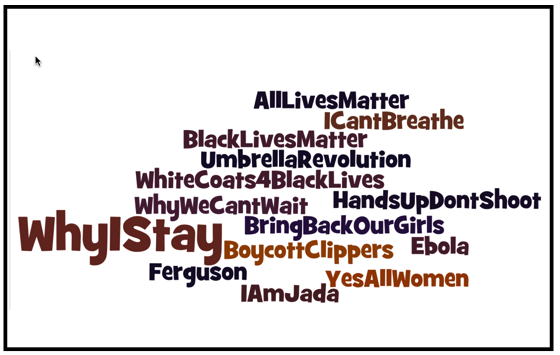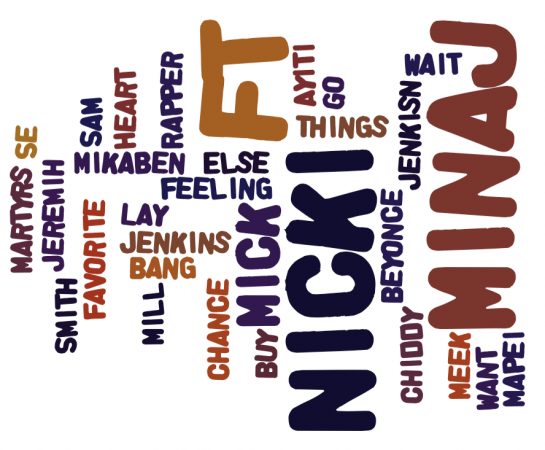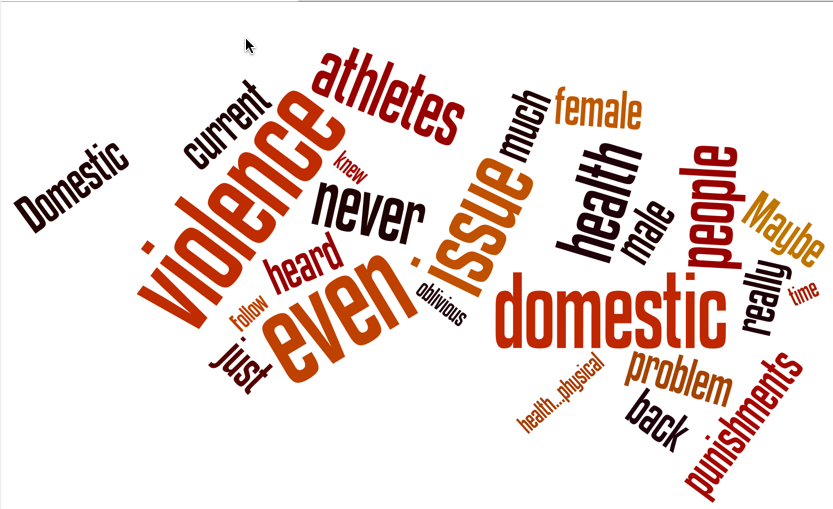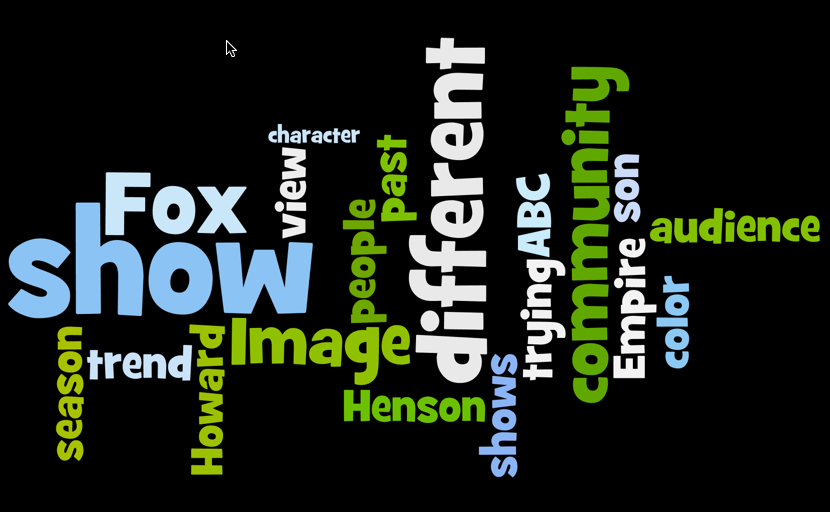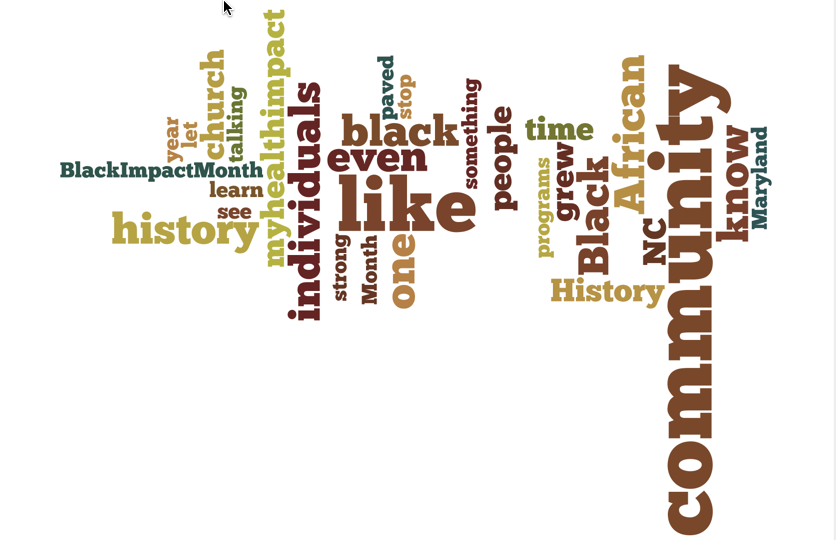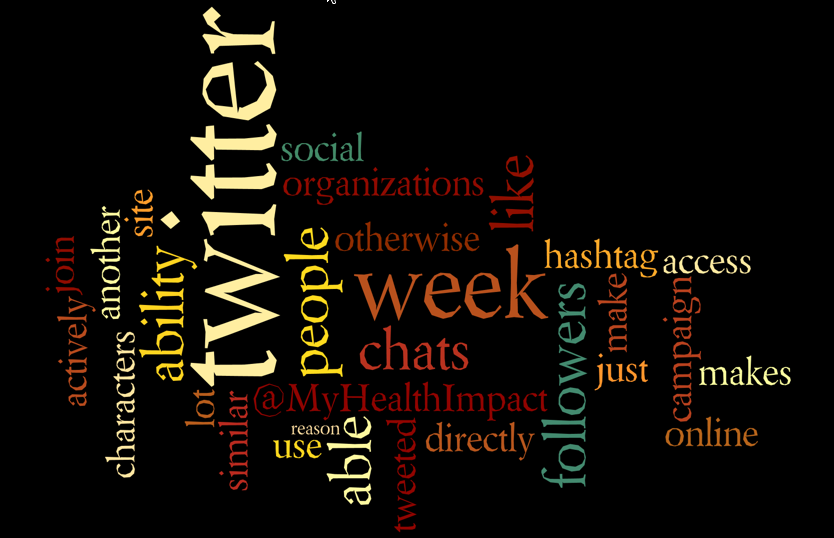myHIN Blog
Category: What is Mental Health? Articles

January 28, 2016
Real Friends
Kanye West recently released a record titled, “Real Friends.” The song provides an introspective look at West’s relationships, which in turn has prompted me to do the same.
As I continue to age, I increasingly see the value in having a strong cohort of friends with whom you can share time, advice, and experiences. It is not enough however to just have a group of friends. It is important for me to be in an environment that promotes growth and support. Surrounding myself with friends who are inspiring and striving for their own success is one of the many ways I create a healthy environment.
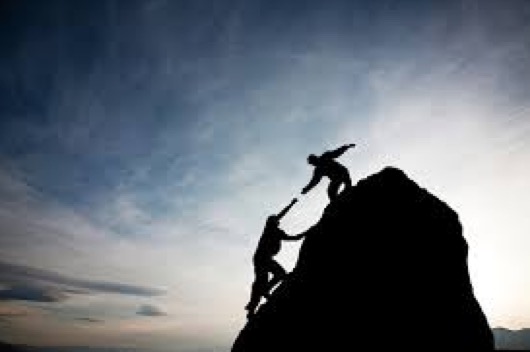 As many of my friends are preparing their post-graduation plans, it can be a time of high stress and relative unclarity. This is where I find value in the companionship provided by friends. With the diversity of experiences throughout my friends, I have seen their creativity fruition into ideas on how to follow their passions through the pursuit of a profession or continued education. The creativity extends past pursuing passions. Our discussions include planning how we will contribute to each other’s successes, providing not just an emotional support but also a support network for our futures.
As many of my friends are preparing their post-graduation plans, it can be a time of high stress and relative unclarity. This is where I find value in the companionship provided by friends. With the diversity of experiences throughout my friends, I have seen their creativity fruition into ideas on how to follow their passions through the pursuit of a profession or continued education. The creativity extends past pursuing passions. Our discussions include planning how we will contribute to each other’s successes, providing not just an emotional support but also a support network for our futures.
These networks have been an integral part of my success since high school. As one of very few students of color at the private school I graduated from, we shared some common experiences in our environment. These experiences created a camaraderie among us that lasts even to this day. Our accomplishments are shared and our shortcomings are uplifted, and for this I am appreciative. 
I have long found great value in being deliberate in the expression of love and appreciation for those in my life. With that being said, a special thank to all of my friends from high school, as well as those who I have had the great pleasure of growing with during my time here at NC State. Check out @myhealthimpact and www.myhealthimpactnetwork.org for this and other information of #health, #culture, #tech and #STEM.
Figure 1: http://www.christcitychurch.ie/life-groups-what-are-they/
Figure 2: http://epasda.org/events/were-in-this-together/
Share

December 09, 2015
Decisions, Decisions: Sexual Health Education or Mental Health
Public Health Education is such a broad field of study, with a vast selection of areas to choose from. There’s tobacco, global health, epidemiology, climate change and a host of others. Out of these various topics, I find myself drawn to a few that seem to peak my interest: Sexual/Reproductive Health education, Domestic Violence, and Suicide/Depression. I haven’t decided exactly which area I want to focus on after graduation, but I have tried to educate myself on these topics.
My interest in Sexual Health came about in my Human Sexuality class that I took my first semester in the Health Education department. At first I only took it because I just need another health elective to take and didn’t think anything of it. We discussed so many things in that short amount of time and I was hooked ever since. My professor has been very influential in my decision to teach sexual health education.

On the weekend of November 21st, I had the privilege to volunteer at the 10th Annual Teen Talk Lock-In for the Wake County Health Department. It was an all night, interactive sexual health education workshop for teens. The key areas of focus were attitude & mindset, healthy lifestyles, and access to resources. They had 5 workshops on building positive and healthy relationships, coping and looking forward to positive outcomes, what love is and how to communicate your love to others, understanding your body inside and out, respecting different lifestyles and identities, and also the importance of Sexual Health Education and HIV/STI testing. I was able to go from session to session with the kids and observe the different speakers, my professor being among them. Seeing them interact with this age group, 12 to 17 year olds, further convinced me that I need to do sexual health education. I would like to further help in the fight to make sex a normal thing to talk about in everyday conversation.
October was Domestic Violence Awareness Month, and I was appointed Chair of the 2nd Annual Women’s Empowerment Program for our Department of Health Education at North Carolina Central University. The purpose of this year’s program was to increase awareness of Intimate Partner Violence (IPV) and its correlation to HIV incidence among college women, through education, empowerment, and condom usage. The goal of the program was to empower young college women to RESPECT themselves in order to PROTECT themselves from HIV. Our keynote speaker and founder of Healing after Domestic Violence (HAD). Her story was so powerful, there wasn’t a dry eye in the house. The program targeted 18 to 24 females on campus. Being in the city of Durham, the young ladies on campus are bound to meet and maybe even start relationships with boys on campus as well as from the surrounding areas. For many of these girls, it is their first time away from home, without direct supervision, and they are likely to take advantage of that. Unfortunately for them, not everyone they deal with will have their best intentions at heart. What can start out as a sweet and loving relationship, can go really south, really fast. The program highlighted signs of domestic violence and where to seek help. There were also booths set up, by myself and my fellow Public Health Associates, showcasing different Social Marketing campaigns focused on Intimate Partner Violence. Resources that are available on campus also had booths set up.
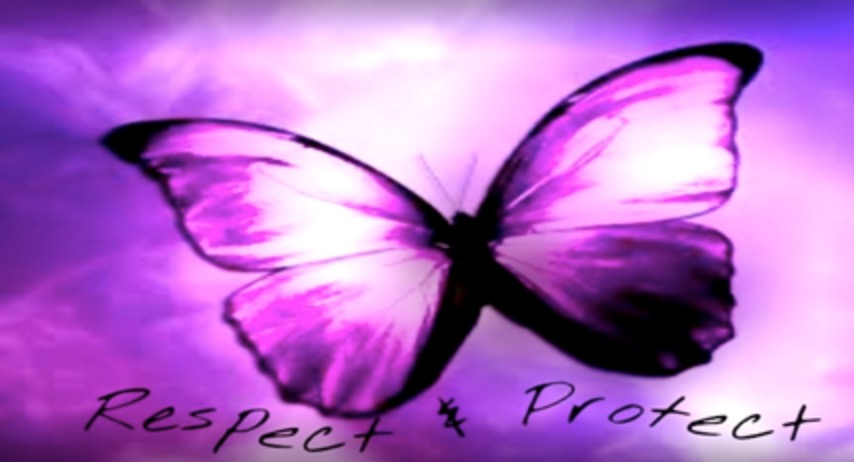
In my research class, we had to choose a health topic to do research on. Normally, I would chose HIV/AIDS, but this time I did suicide and depression, focusing on African American women. I was very surprised that it was hard to find almost any articles on my target population. I’m talking about hours and hours of searching for an article even remotely focusing on depression or suicide in African American women. It was alarming to me, and made me think why no one had decided to do any research on this underserved population, in this regard. As a part of the aforementioned population, I personally know that depression is real in the African American community. There is also a stigma attached to it. I’ve heard people say “Black people don’t get depressed. That’s only crazy white people. Just get over it.” What people don’t realize is that downplaying anyone’s feelings of depression is not helping them at all, and possibly even worsening it, leading them to suicide. If I were to choose this as my final area of focus, I would definitely want to go into research regarding African American women and teenagers.
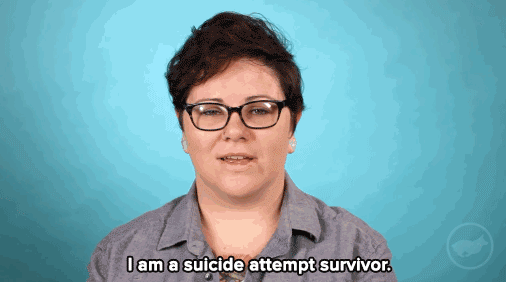
I wasn’t sure how Public Health Education was going to work out for me when I first transferred to the department, but I soon found my place. I chose to focus on these topics for various reasons. I know people who don’t know how some STIs are transmitted and don’t know how to use condoms properly. I know others who have been in abusive relationships, not even realizing that they were in one, and not want help trying to leave the person. That hurt me, that as their friend, they didn’t want me trying to help them. I, myself, struggle with my own depression, and dealing with it. There is always someone who needs public health education and resources, and as a future health educator, I am working hard so that one day I can help others with their problems.
Follow @myhealthimpact on health and tech stories impacts #youngppl. #publichealth #mentalhealth #sexualhealth
Share

November 19, 2015
Mental Health Among My College Peers
I wish that individuals suffering from mental health issues could feel the embrace of support on a national scale. I think about the utilization of pink to express the support of breast cancer and seeing it on television, on football fields, and on college campuses. I think of the hope that comes with such support, and I long for something similar in regards to mental illness. The American Psychological Association reported that 44% of the patients who visited college counseling services “had severe psychological problems.” This number, however high, does not begin to tell the full story on mental health, especially in the college aged demographic. The stigma surrounding mental health issues is often silencing, which is why it must be spoken about deliberately. In the last year, NC State has lost two students to on-campus suicides, and even more outside of campus. This is to say the least, both concerning and devastating.
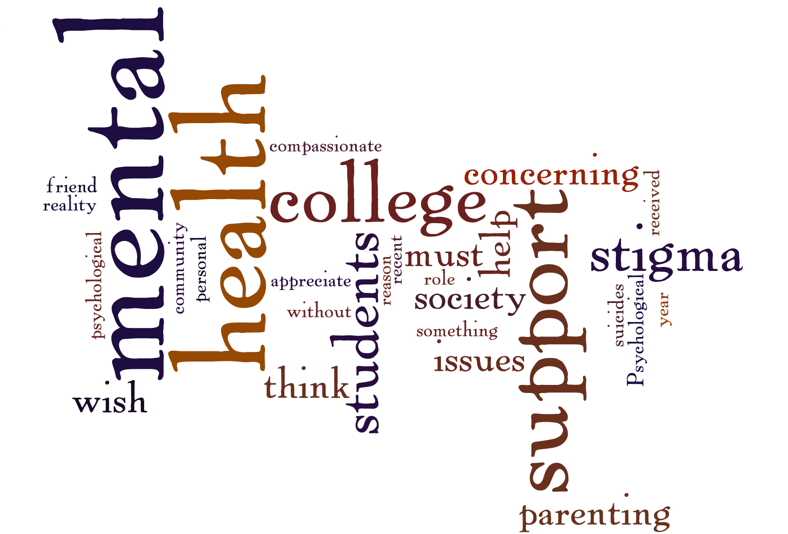
I am very thankful of my parents for raising me to be a compassionate friend and an attentive listener. They modeled for me to listen without judging and as a result I believe many of my friends have felt comfortable sharing openly with me their stress and worries. Some may say I am a bit hypersensitive to the mental health of others, I don't mind that personality trait. In a recent conversation with my mother who has practiced as a psychotherapist for over 20 years, she reminded me that one of the biggest barriers to young adults seeking help for their mental health is the role that stigma plays in our society. The reality of stigma is that it perpetuates isolation, shame, and hopelessness. It is understandable that individuals with emotional distress would be hesitant to ask for help in this environment.
As a society, we are generally unaware of the level of struggle that college students face with regard to mental health. There are students who walk in the dark every day without feeling supported and it is up to us as friends, faculty, acquaintances, classmates, and a community to help break the silence, increase awareness and show more compassion to those suffering from mental illness. We have both an individual and collective responsibility to support each other, this is the only way out of the stigma of mental illness.
Follow @myhealthimpact for real talk on often hard topics.
#mentalhealth #collegestudents #stigma #supportsystems
Share
March 01, 2015
MyHealthImpact Topics 2015
Click on the word clouds below to see a recap of the wonderful blogs by our Research Team so far in 2015.
Stay tuned to @myhealthimpact for more news on the interconnection between health and tech!
Share

January 22, 2015
Breaking the Silence
With the new sense of hypervigilance, particularly in relation to domestic violence, I hope that we as a community can come together in active support of survivors of abuse. It must be clear that violence towards others in any form should not to be accepted, regardless of profession. I hope to see advancements with the NO MORE PSA campaigns, Purple Purse, and the NFL, realizing their goals of decreased rates of domestic violence and increased support of the victims.
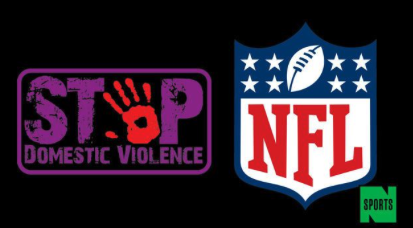
In recent months there has been significant media coverage concerning the lives, specifically the legal matters, of professional athletes. The abuse perpetrated by Ray Rice was seen by many outside of the sports world, and was the first of many noteworthy incidents involving his colleagues of the National Football League. Since Rice’s arrest, Greg Hardy, Ray McDonald, and Adrian Peterson have been in the news for their respective criminal acts. Athletes breaking the law is nothing new. In the past, fans have often been aware of the personal lives of athletes, even with minimal media coverage, but there seems to be a shift regarding the awareness. It is no longer solely fans who hear about the incidents, the coverage by major news outlets has increased the audience.
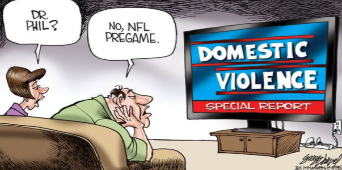
USA Today compiled a database of all NFL player arrests since 2000, citing 85 of the 713 arrests were made regarding situations of domestic violence. Being that domestic violence is the one of the most underreported crimes, it is reasonable to assume that these numbers are not completely representative of the truth. The difficulty to speak about domestic violence is highlighted in the “Speechless” series of NO MORE PSA. The commercials have aired in recent weeks showing celebrities, as well as current and former NFL players sitting in silence as they attempt to speak on domestic violence. Allstate Foundation Purple Purse is another group bringing domestic violence, and financial abuse in particular, to the forefront. Allstate Foundation reports that financial abuse occurs in 98% of domestic violence cases. This staggering number has prompted Purple Purse to make it “fashionable” to speak about domestic violence through fundraising to support survivors.
 As we have seen, the issues faced by athletes are mirroring the societal issues we are facing today. The question of corporal punishment, the prevalence of substance abuse, the charges of domestic violence, and even the statements of solidarity displayed following the killings in Ferguson and Staten Island, in relation to the athletes of the NFL, have all led to further questions addressing all people, instead of athletes exclusively. We must continue to recognize that as contributing members of society we have a responsibility to treat ourselves, and each other, with respect and dignity at all times.
As we have seen, the issues faced by athletes are mirroring the societal issues we are facing today. The question of corporal punishment, the prevalence of substance abuse, the charges of domestic violence, and even the statements of solidarity displayed following the killings in Ferguson and Staten Island, in relation to the athletes of the NFL, have all led to further questions addressing all people, instead of athletes exclusively. We must continue to recognize that as contributing members of society we have a responsibility to treat ourselves, and each other, with respect and dignity at all times.
Continue to follow @myhealthimpact on the latest news regarding domestic violence and your health!
Share

October 13, 2014
Identity Crisis
Though I am half way into my first semester as a PhD student. I am still trying to figure out out my new identity. I was told before I started this journey that I will lose friends and my relationships will disintegrate but I never thought it would ever happen to me.

The biggest struggle for me would have to be that I am at the same institution that I was at for undergrad. There were so many activities and organizations that I was apart of that contributed to my identity but now all that has changed. The largest one would have to be running track. Since I have been a freshman in high school track has always been a major deal in my life. Between practicing, having injuries, traveling, bonding with my teammates, and learning life lessons from my coaches, track was something that enticed me.
Track was an anchored structure in my life. All activities I did were based on my track schedule. There were times I would stay up late to do homework and the fear that I would miss practice if i went to sleep too late encouraged me to pull all-nighters. Times when I would not go out to a party with my “normie(non-athletes)” friends because I knew I would have a hard practice the next morning. Track encouraged so many positive things in my life. It got me to be more mindful about my diet since it reflects my performance, teaching me that I could push my body to new limits beyond my wildest dreams.
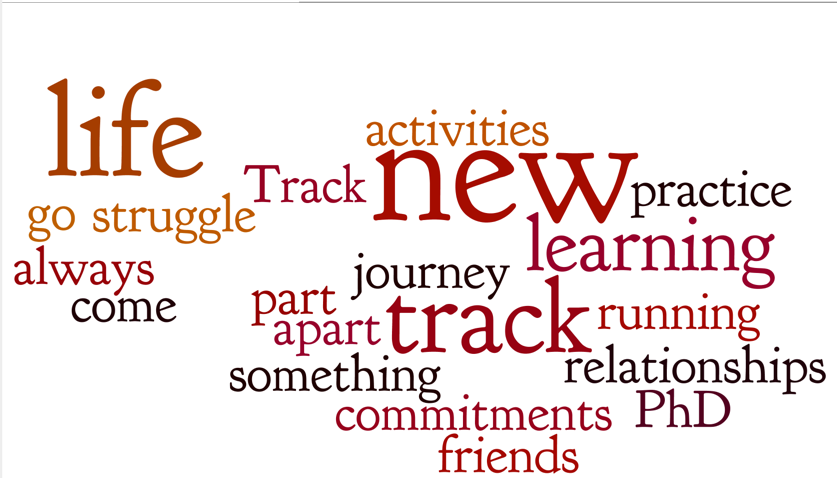
Being apart of something that you actually enjoy for 8 years is an amazing commitment. The hardest part is letting it go; but here’s the kicker, you don’t have to! I’m learning how to redefine what running is to me. I would relate this transition to moving to the other side of the country, away from your best friend. No, you won’t be able to see each other every day nor call every other week like you used to. However, it’s a mutual understanding; you can pick up the phone and talk for hours like the old days. That’s the type of relationship that I am learning to be okay with. It’s definitely a struggle at first, but it’s comforting to know that it’s always there for you when you need it.
I suppose redefining what these things mean in your life is a large part of this PhD journey. With new goals, come new commitments and with new commitments, come new relationships.
Follow us at @myhealthimpact as we continue to discuss important topics relating to heath and tech.
Share

August 13, 2014
“Selfies” and Mental Health Disorders
Experts including Dr. Lucie Hemmen and Dr. David Veal are beginning to consider a compulsion to take selfies as a serious mental health problem. Individuals can spend hours, even days taking hundreds of selfies in an attempt to capture the “perfect” photo (McKay). Taking selfies can lead to technology addiction and Body Dysmorphic Disorder — a chronic mental health condition in which the sufferer obsesses over perceived flaws with their body. In addition to that, it has been proven by multiple studies that taking selfies can be detrimental to a person’smental health, and it can be linked to narcissism, depression, and low self-esteem.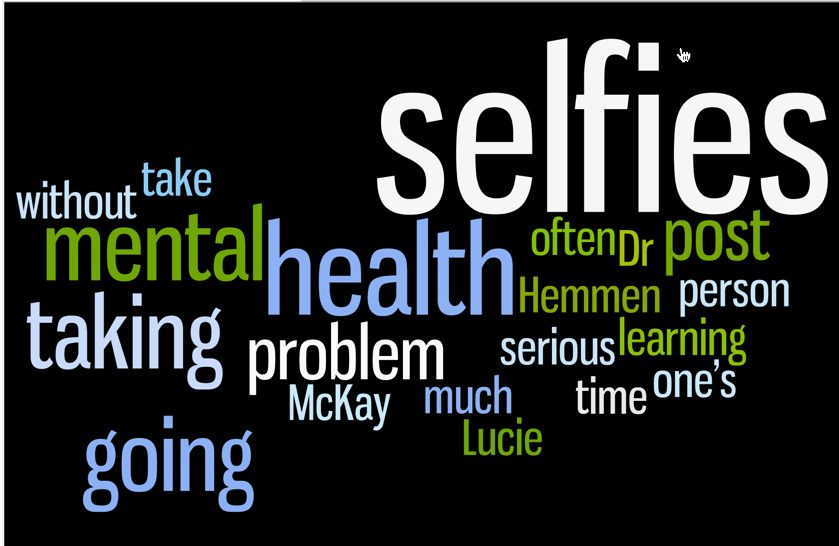
So how can we fix this problem? First, we have to realize that there is a deep denial about how dangerous it is to interact with screens without setting limits on how much time is spent doing so. With that said, it is hard to convince people that the effects of taking selfies are serious. Nevertheless, the common treatment of taking selfies is gradually learning how to go for longer periods of time without satisfying the urge to take a photograph, along with therapy to address the root cause of the problem. Thus, learning how to use selfies in moderation. Selfies, if used properly, can be a feel-good and often creative way, to chronicle one’s life and emotions and express one’s personality.
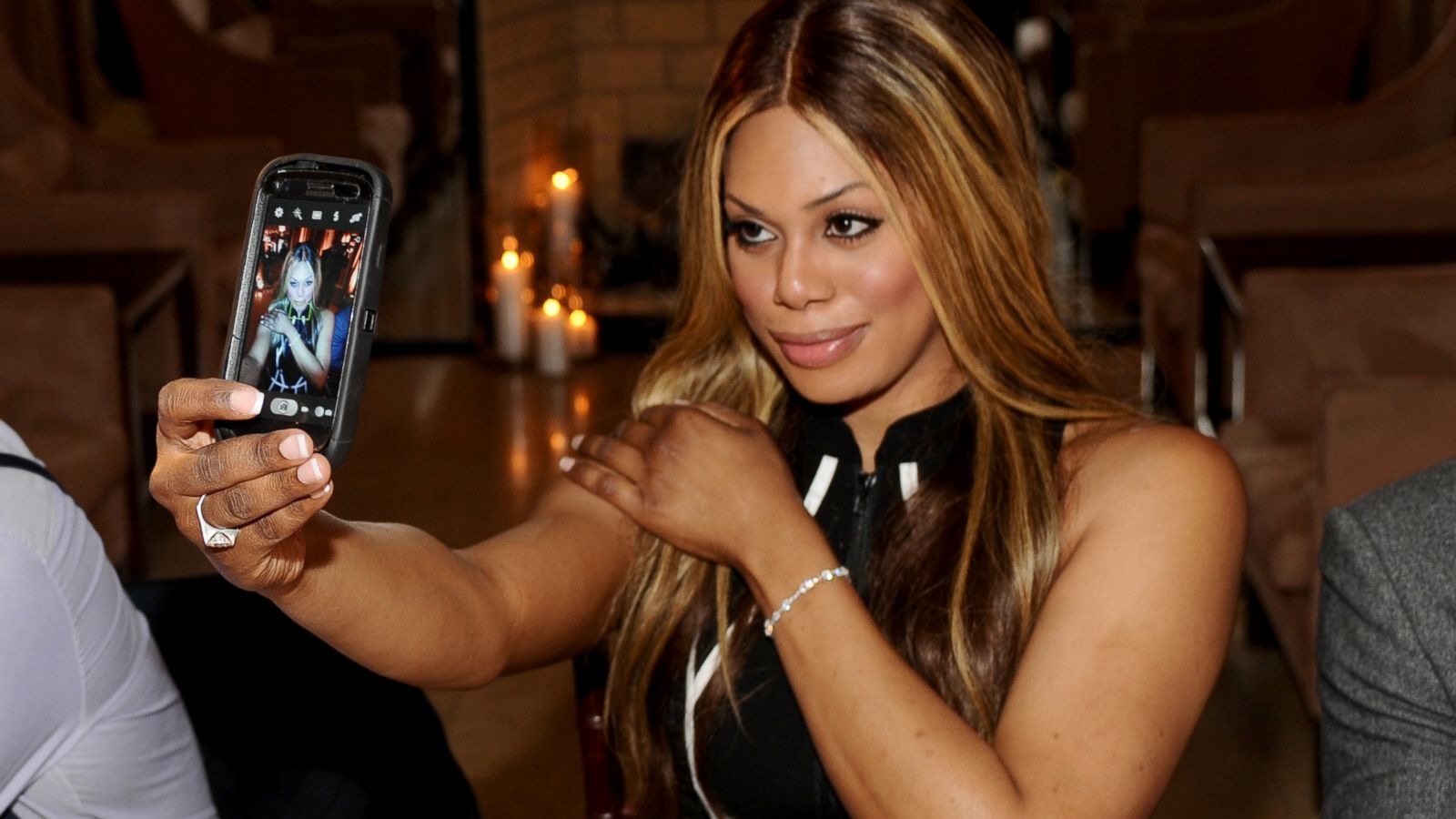
In conclusion, know this—According to clinical psychologist Lucie Hemmen there is a continuum of health and authenticity in what you shoot and post (McKay). A secure, mature person is going to post selfies that are spontaneous and not overly engineered or edited, and they're going to do it less often. A more insecure person is going to post staged or sexualized photos, and they're going to do it so much that they become consumed by it and the comments they receive. Let’s not let selfies control our mental health.
McKay, Tom. "A Psychiatric Study Reveals Selfies Are Far More Dangerous than You Think." PolicyMic. N.p., 28 Mar. 2014. Web. 16 June 2014. <http://www.policymic.com/articles/86287/a-psychiatric-study-reveals-selfies-are-far-more-dangerous-than-you-think>.
Share

June 04, 2014
For Brown Girls
I’ve recently begun blogging and the story of Karyn Washington the creator of ‘For Brown Girls’ caught my eye and captured my heart. Washington reportedly committed suicide at the tender age of 22 after suffering from depression stemming from the loss of her mother. This hit my heart for two reasons. 1. She’s only a year older than me…a college student and 2. She’s a blogger that was interested in empowering and encouraging women to love themselves. These two things are practically I. I’m amazed at the fact that as she still desired to help others and while doing so, she was dealing with her own things.
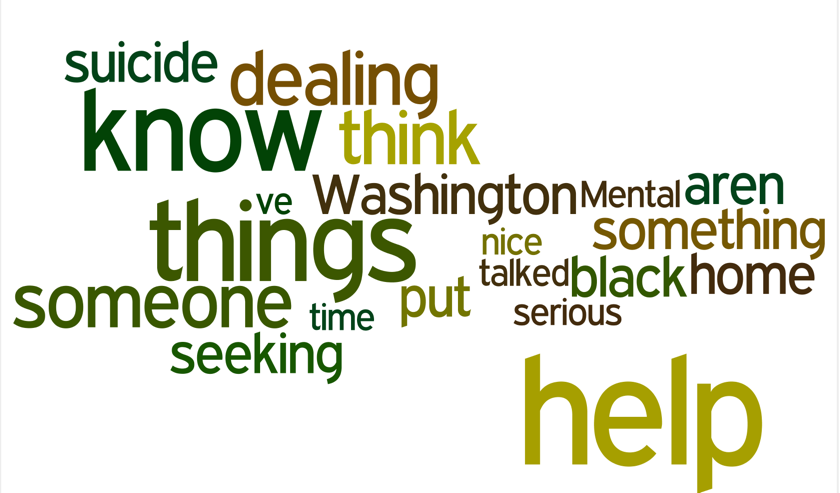
Mental health is something serious. Did you know that depression is a mental illness? Let me make something really clear: you, we, she, he is not exempt. College students are not exempt. We (the black community) always seem to think that some things “aren’t what black people do”. Mental issues, mental health and stability have no face, color, socioeconomic status or background. Depression and suicide are things we deal with right in our own backyards…our own living rooms. We have to know and understand that there is nothing wrong with seeking help. You aren’t crazy for seeking help with coping with the loss of a parent or dealing with suicidal thoughts or even for being sad. Those sad thoughts may be more serious than you think if not tackled. To me and I don’t know how much my opinion counts to you but I truly admire those that are out to better themselves and are worried about their own well-being; self-love. I’ve noticed that the black community…it’s of our culture to believe that what happens in our home, stays in our home and that our issues will not be talked about and ridiculed among complete strangers or the Joneses’. Seeking help is saying I know I’m dealing with some things and recognizing the fact that all things aren’t able to be solved in the comfort of your own home but better on someone’s couch. We, yes WE must kill the stigma placed around seeking help. Did we think that these resources were put into place to hinder? We must kill our prides.
I’m sure committing suicide was the last thing on Karyn Washington’s mind at some point; let’s be real here her purpose was to help, promote self-love and seeing the beauty in which we are. I think it’s fair to say everyone can put on a façade but a façade can only be put on for so long. You never know what people are dealing with. Take the time to say something nice. Take the time to check on someone that you haven’t talked to in awhile. You never know what someone is going through and how much of a positive effect your nice words and thoughtful actions can be of help. Know that it is ok to seek help. Do not allow someone to talk you out of taking care of you.
See @myhealthimpact on Twitter, the web at myhealthimpactnetwork.org and on Tumblr for more information on mental health.

Gone too soon….
Share

September 10, 2012
“You Ain’t Crazy: It’s Your Mental Health!”
On Thursday, August 30th, Dr. Payton gave a presentation on campus titled ‘You Ain’t Crazy: It’s Your Mental Health’ where she discussed mental health issues in the African-American community. What stuck out to me the most was the video she showed featuring Terrie Williams where she talks about her book “Black Pain: It Just Looks Like We’re Not Hurting”. Williams talks about how people think they are the only one who is going through something so they keep things bottled in and suffer from depression, hyper tension, and heart disease; or it will come out through self-medicating, gambling, sex, risk behaviors, etc. Risk behaviors can only increase the chance of being exposed to HIV.
For some strange reason, in our community, when we are suffering from something such as depression, we don’t go and get help. Instead, we turn to a friend who ends up giving us bad advice or just decide to seek a spiritual source to resolve our problems. While I am not knocking the latter, sometimes it is good to keep mental and spiritual health issues separate. Unfortunately, I am speaking from experience.
Last semester I had things going on with my family that I had never experienced before and I didn’t have time to react properly. I used my school and extra-curricular activities as a way to block everything out until one day it caught up with me. I literally woke up crying. I didn’t go to class that morning (which added to my stress) and I reached out to one of my sorority sisters who I am close with. Having experienced depression before, she forced me to go to the University Health Center to seek counseling. I was skeptical at first, but I figured it wouldn’t hurt to talk to someone who was a professional. I went to the Health Center and was told that I needed to set up an appointment. I was upset because I didn’t want to wait to talk to someone in seven days; I needed someone at that moment. I was afraid that my natural habit of pushing things away would hinder me from receiving proper help. In any case, I set the appointment and returned a week later. Unfortunately, the counselor was not helpful, but I was proud of myself for taking the initial step.
When I told certain people in my family that I went to see a counselor their response was ‘what do you need to do that for?’. I responded ‘to make sure I don’t go crazy!’. I also told them that I wanted to find another counselor and begin seeing them regularly, again they asked ‘what do you need to do that for?’. I believe that counseling can help you receive an unbiased opinion on how you should move forward. A counselor does not give you advice based on experience. They give you advice based on clinical research that can help you control your reaction to events that you can’t control. Can you control risk behaviors?
If you’re reading this and you have something that you are dealing with, seek help. More than likely you are not alone in the matter. If you need motivation, watch the video below featuring Terry Williams who also gives her personal testimony about battling with depression.
For up-to-date information, follow @myhealthimpact on Twitter!
Share
In Partnership with: Poole College of Management, College of Humanities and Social Sciences, National Science Foundation, Penn State
Take Action, Get Tested: Find Your Local Testing Center Why Get Tested?
